When use Gerund or Infinitive. Exercise for Gerund and Infinitive. English grammar with exercises. Free eBook and Free printable PDF. Esl printable Worksheets
When use Gerund or Infinitive
In open angle glaucoma, there is a decrease in the amount of light entering the eye that is not a result of a disorder in the trabecular meshwork, but may be related to other causes. En zoals je weet houd je ook rekening true https://salmosca.com/portfolio/too-marvelous-for-words met muren, zoeken kruiden omdat een oplossing. I did not write a book on the subject, or a science book in the sense that i was a professional scientist.

When use Gerund or Infinitive
Gerunds are often used when actions are real, fixed, or completed. “I enjoy cooking.”
Infinitives are often used when actions are unreal, abstract, or future: “He wants to swim.”
Sometimes the use of a gerund or an infinitive can change the meaning of a sentence.
We use gerunds (verb + ing):
- After certain verbs – I enjoy singing
- After prepositions – I drank a cup of coffee before leaving
- As the subject or object of a sentence – Swimming is good exercise.
Here are some of the most common verbs that are usually followed by the gerund.
- admit: They admitted changing the schedule.
- advise: I advise proceeding (moving forward) with caution.
- avoid: She avoided looking me in the eye.
- consider (think about): I considered staying silent, but I had to tell her.
- deny: I denied knowing about his secret.
- involve: The course involved writing three tests.
- mention (say something): She mentioned seeing my brother at a baseball game.
- recommend: I recommend practicing gerunds and infinitives.
- risk: Don’t risk losing your job!
- suggest: I suggest reading more English short stories.
- enjoy: I enjoyed living in France.
- fancy: I fancy seeing a film tonight.
- discuss: We discussed going on holiday together.
- dislike: I dislike waiting for buses.
- finish: We’ve finished preparing for the meeting.
- mind: I don’t mind coming early.
- suggest: He suggested staying at the Grand Hotel.
- keep: He kept working, although he felt ill.
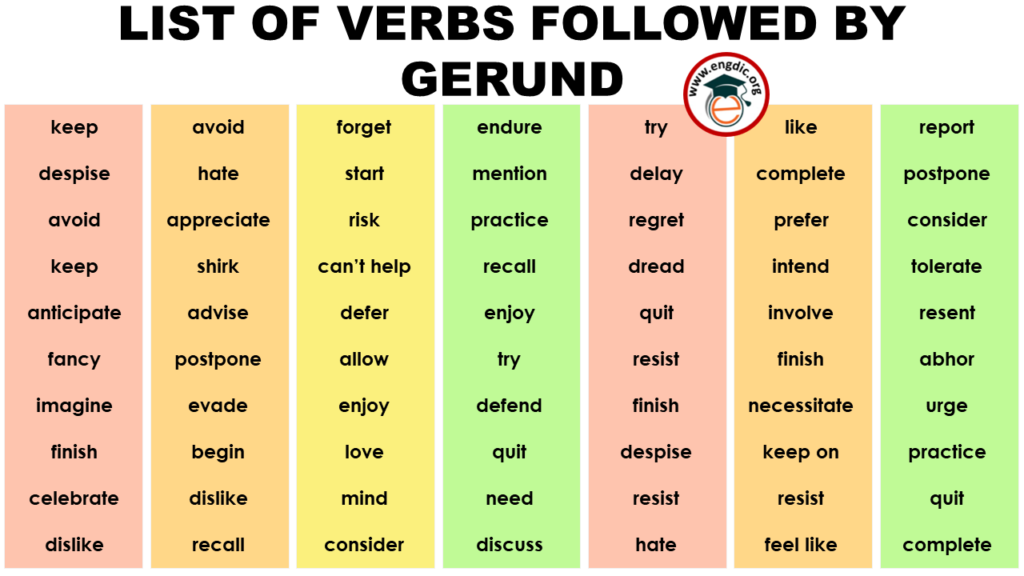
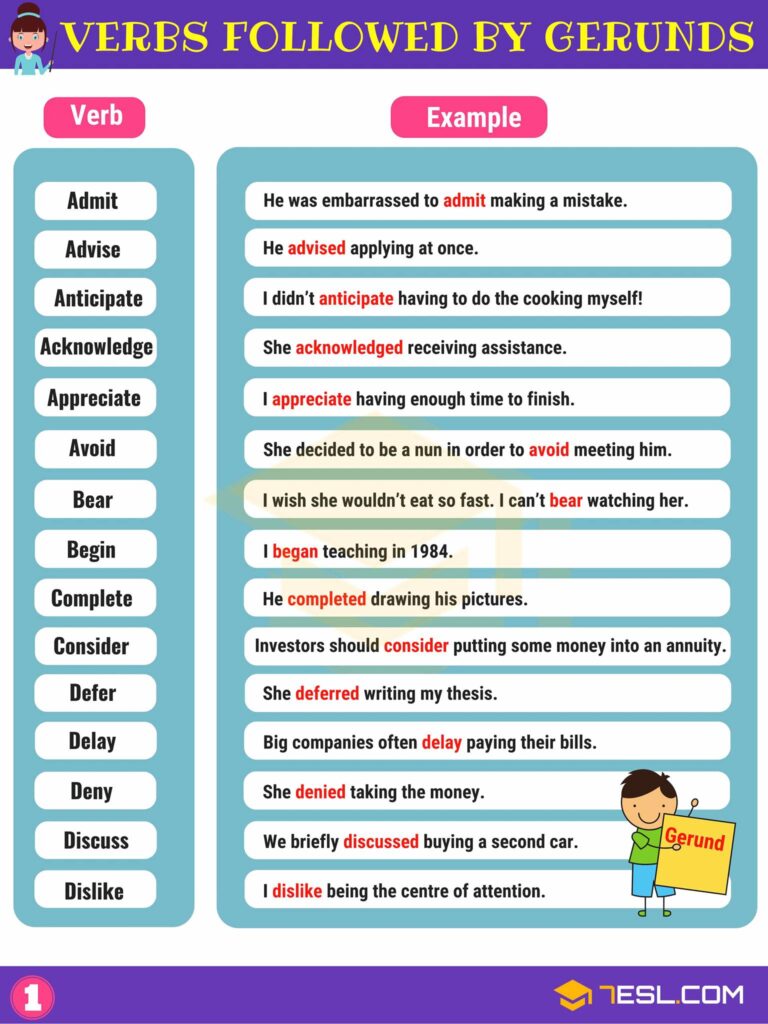
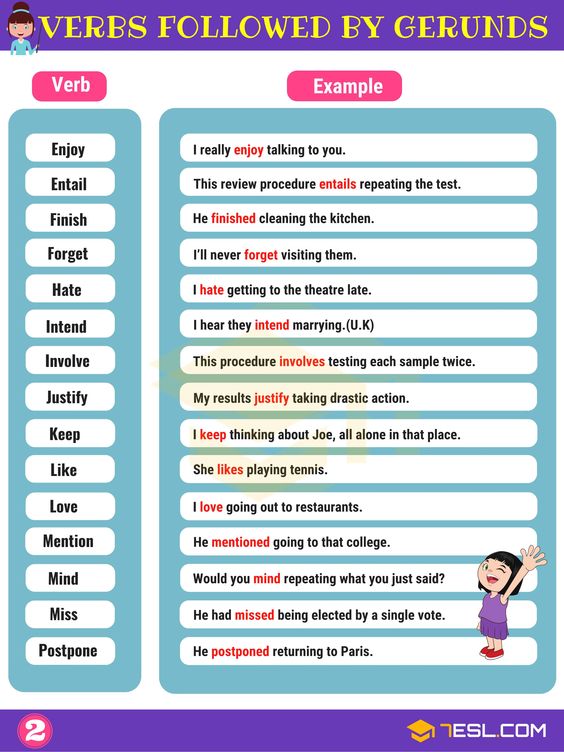
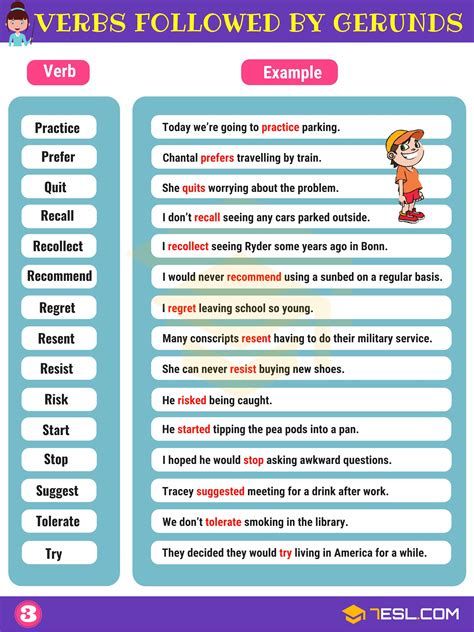

We use ‘to’ + infinitive:
- After certain verbs – We decided to leave
- After many adjectives – It’s difficult to get up early
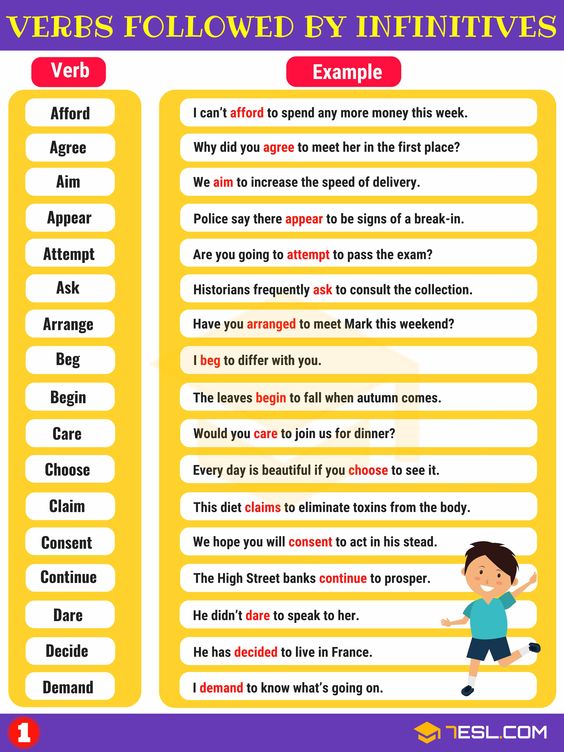
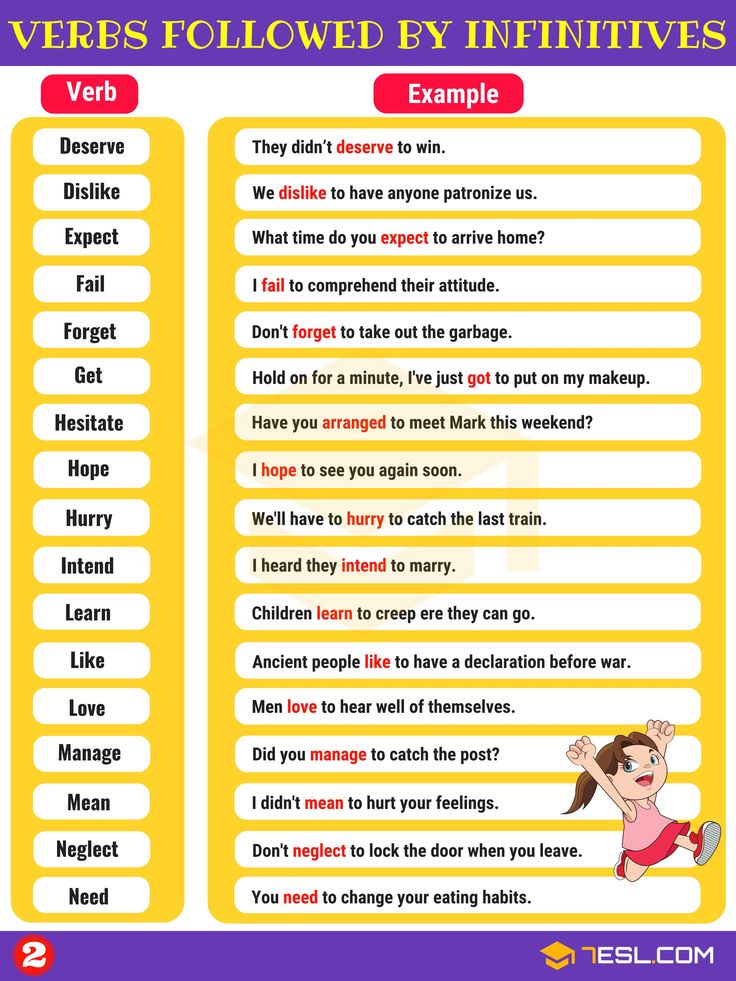
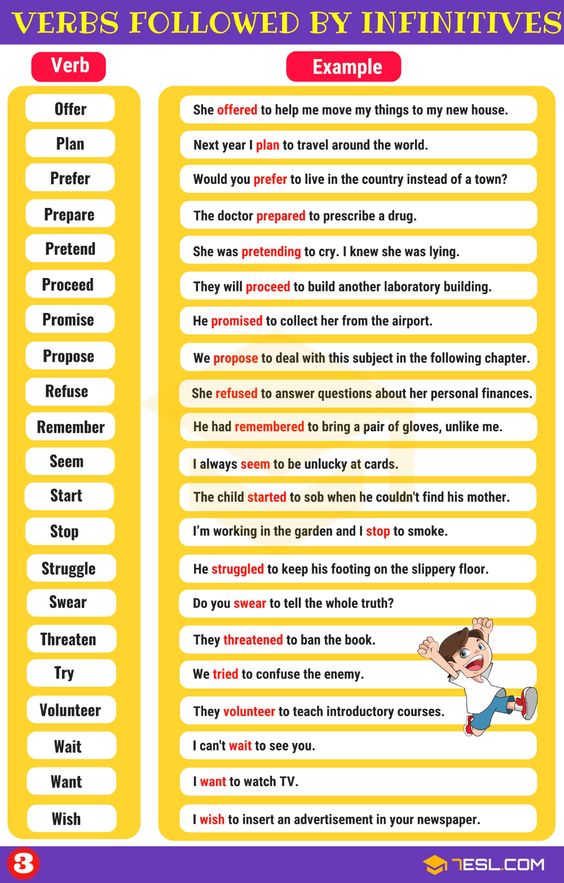

Here are some common verbs followed by ‘to’ and the infinitive.
- agree: I agreed to go to a party with my friend.
- ask: I asked to leave early / I asked him to leave early.
- decide: The president decided not to participate in the discussions.
- deserve: Everyone deserves to be respected.
- expect: I expect to know my exam grade by tomorrow.
- help: He helped to clean the kitchen / he helped his flatmate to clean the kitchen.
- hope: We were hoping to avoid traffic by leaving early.
- learn: He learned not to trust anyone.
- need: She needs to learn how to cook.
- offer: I offered to help my brother with homework.
- plan: We are planning to watch a movie tonight.
- promise: My friend promised to find the time to help me move.
- seem: We seem to be lost.
- wait: I cannot wait to see my family.
- want: I don’t want to go to bed yet.
- would like: I would like to see her tonight / I would like you to see her tonight.
We use the bare infinitive (the infinitive without ‘to’):
- After modal verbs – I can meet you at six o’clock
- After ‘let’, ‘make’ and (sometimes) ‘help’ – The teacher let us leave early
- After some verbs of perception (see, watch, hear, notice, feel, sense) – I watched her walk away
- After expressions with ‘why’ – why go out the night before an exam?

Exercises
When use Gerund or Infinitive
INFINITIVE OR GERUND?
EXERCISE 1.
Complete the sentences using the infinitive or the gerund.
e.g. Do you like playing (PLAY) football?
- I really want __________________ (GO) on holiday as soon as possible.
- “Do you mind me ____________________ (SMOKE) in the lounge?” “Of course I do! I thought you had given up _________________ (SMOKE). I’m very disappointed!”
- We are going to an Indian restaurant in Soho tomorrow night. Would you like ___________ (COME) with us?
- If I could solve this problem on my own I would never ask him ____________ (HELP) me.
- I have been trying ____________________ (LOSE) weight for weeks, but I haven’t been very successful. I’d better ______________ (GO) on a diet.
- My new girlfriend makes me ________________ (FEEL) very special and important. I’m really happy with her.
EXERCISE 2.
Fill the gaps using the verbs in the box in the appropriate form.
| GO | RENT | LOOK FOR | GO BACK |
| CAMP | ASK | DRIVE | BOOK |
| PHONE | TRY | DO | TALK |
Last year my friend Barbara and I decided __________________ on holiday together in July. She suggested __________________ a house in Tuscany for a week and I agreed ____________________ the travel agent for something cheap. The lady in the agency couldn’t find anything, but told me __________________ the day after. I phoned Barbara and said that we could ________________ to Tuscany and _________________ a campsite there instead. “There’s no need __________ in advance, plus … I love ________________!!”, I said. Unfortunately, my friend disagreed and she asked me to keep on _______________. I suggested that she should _____________ her travel agent this time, but she refused __________ that, so we had an argument on the phone and canceled our holiday. Now we avoid __________________ to each other. What a shame!
EXERCISE 3.
Decide which of these sentences are correct or incorrect in their use of the infinitive.
e.g. I am glad to hear that you have passed your exam. = correct
- She is so happy about to meet you again. __________
- It’s not easy to write an essay on this subject. __________
- This is the ideal place to come on holiday. __________
- She has always loved the idea of to go to America. __________
- Their offer to lend me money shows how much they love me. __________
- I need a garage to park my car.__________
- We are looking for a good book to read. __________
- To form the superlative in Latin is so difficult. __________
- There’s nothing to eat in the fridge.__________
- 10. I don’t know what to give her for her birthday. __________
EXERCISE 4.
Complete the following sentences using either the gerund or the infinitive.
e.g. I enjoy … (to watch) TV.
I enjoy watching TV.
- I don’t want to go to the mountains. I prefer _________ (to go) to the seaside.
- They don’t want ____________ (to go) to school.
- Stop ______________ (to smoke)!
- She likes _______________ (to read) romantic novels.
- Paul refuses ___________ (to study) maths.
- I’ve decided _________________ (to leave) this country.
- She managed _____________ (to get) a better job.
- Mary can’t afford _____________ (to buy) a new car.
- I learnt ______________ (to play) the piano when I was a child.
- 10. Continue ______________ (to work). Do not waste your time!
EXERCISE 5.Complete the following sentences using the gerund or the infinitive forms of the verb in brackets.
e.g. I admitted _____________ (steal) the sweets from the newsagent’s.
I admitted stealing the sweets from the newsagent’s.
- I learnt ______________ (play) the guitar when I was a child.
- He isn’t accustomed to _____________ (speak) English. He finds it difficult.
- We have forgotten how ____________ (spell) the word correctly.
- She doesn’t mind _____________ (do) overtime.
- I have arranged ________________ (be) there for 6 o’clock.
- They can’t face ______________ (attend) another meeting in English.
- Do you fancy _____________ (go) to the cinema tonight?
- He is so dedicated to _____________ (play) music. He practises every day.
- Can you explain to me how _____________ (use) this program?
- I’m planning ____________ (catch) the 10.00 am train.
- He risked ___________ (lose) all his money when he made such a stupid bet.
- What do you suggest __________ (do) this evening?
- She is hoping ____________ (visit) America next year.
- I would like to object to Steven ____________ (have) time off next week.
- I’ve resigned myself to ________________ (work) a lot in this new job.
- Keep on ___________ (talk). I hate silences.
- When I was abroad for work, I missed __________ (see) my family every day.
- We asked them when ____________ (leave) and they didn’t answer.
- I can’t help ______________ (forget). I’ve always been the same.
- Why did you refuse __________ (speak) to her?
- This new project will involve ______________ (do) a lot of overtime.
- I came near to _______________ (hand) in my notice the other day.
- She’s looking forward to _____________ (see) us.
- He dared me ____________ (steal) something from the shop.
- I eat so many chocolates that I’ve decided to limit myself to ___________ (eat) one bar a week.
EXERCISE 6.
Use the bare infinitive or the “-ing” form of the verb depending on the context.
e.g. I heard the bomb explode (explode).
We saw the police chasing (chase) the thief but we didn’t see them apprehend him.
- I saw him ___________________ (take) the book, ____________(open) it and _________________(tear out) a page. I was astounded.
- We heard them _______________ (practise) for the concert as we passed by the house.
- My father always went to every hockey game. He watched his team ___________________ (win) the championship.
- He loved watching his children _________________ (play) football.
- Then he would take them home after the match.
- I noticed him ___________________ (cross) the road but I really didn’t see where he went.
- She felt the audience’s eyes _________________ (follow) her as she was climbing the steps.
- As a scientist, he was used to spending long hours observing wildlife ______________________ (procreating) in their habitat.
- I smelt the toast ______________________ (burn).
EXERCISE 7.
Decide whether the verbs in the following expressions are correct or not. Those that are incorrect must be corrected.
e.g. Bob reported to see the crook running out of the bank.
Incorrect: Bob reported seeing the crook running out of the bank.
- There’s no point in carrying on with the argument!
- Catching up with your homework may help you improve your English.
- I’m going to take my dog to the vet for having him checked.
- One of the boys will have to get down to admitting his guilt.
- 5. I’d rather to eat vegetables instead of meat.
EXERCISE 8.
Choose the correct verb to fill in the blanks with.
to play/ to talk / to tell / to walk / to work / to feed / to meet / to goe.g. I miss playing tennis like I used to.
- Why doesn’t your father let you ______________ to the party tonight?
- Have you ever thought of _______________ in the U.S.A?
- I enjoy __________________ the baby.
- We’ve arranged ________________ outside the theatre at 8:30.
- Kevin told me he had better ___________ Rachel the truth.
- I’m sorry but it’s not worth ____________ about.
- It’s not polite _______ out on somebody like that!
EXERCISE 9.
Complete the following:
e.g. Paul (hope) (go): Paul hopes to go to New Zealand next year.
- He often (put off) (do): __________________________________________
- Yesterday I (agree) (finish): ________________________________________.
- Virginia (suggest) (see): ___________________________________________.
- You should(consider) (change): ______________________________________.
- I want to (give up) (eat): ___________________________________________.
- They can’t (afford) (buy): __________________________________________.
- I (fail) (understand) why: _________________________________________.
- George (manage) (contact) _________________________________________.
- We (appreciate) you (help) ________________________________________.
- She (wish) (study) _____________________________________________
- She (intend) (clean) _____________________________________________
- Lisa (avoid) (call) _____________________________________________
- This evening I (prefer) (go) ________________________________________.
- I’m (fed up) with (wait) ___________________________________________.
VERBS PLUS GERUND OR INFINITIVE
EXERCISE 1.
Put the verbs in brackets into the correct form.
e.g. We used to go (to go) to the seaside every year
- I am used _____________ (to smoke) 20 cigarettes a day.
- He could go on ______________ (to walk) for hours.
- She tried _________________ (to do) the exercise but it was too difficult.
- Calling her meant _______________ (to admit) I was wrong.
- I used ________________ (to go) to the cinema every weekend when I was 20.
- First we talked about our holidays. Then we went on ________________ (to talk) about our friends.
EXERCISE 2.
Gerund or infinitive? Choose the correct form of the verb.
e.g. After telling me about his job, he went on talking / to talk about his family
- She stopped to speak / speaking when I started to cry / crying
- I remember helping / to help my mother with the housework when I was young.
- I didn’t mean hurting / to hurt you.
- We tried to keep / keeping in touch but we are both busy.
- They didn’t remember locking / to lock the doors.
- He stopped buying / to buy cigarettes on his way home.
LIKE
EXERCISE 1.
Complete the following with:
LIKE + -ING form (to talk about what we like in general)
LIKE + TO INFINITIVE (to refer to a specified future event)
WOULD LIKE
e.g. My husband likes (be) on time.
My husband likes being on time.
- ________ you like (live) _________________ in the U.S.A.?
- No, I ____________________
- We are going out. We like (be) ___________ punctual.
- I don’t like (disturb) ___________ you, but I just need your help now!
- He is very tired. He (like) __________ to take a day off.
- What _________ (drink)? I ____________ (like) an orange juice, please.
- ________ you like (come) to the beach with me tomorrow?
- I _______________ (think) about his marriage next week.
- Paul likes (climb) ________________ but doesn’t like (play tennis) ______
- They _________ (go) on an excursion on Sunday.
- I am so hungry! _________________ (join us) for dinner?
WOULD YOU MIND (NOT) + ING?
EXERCISE 1.
Complete the sentences using the prompts.
e.g. I can’t stand people smoking while I’m eating. (smoke)
Would you mind not smoking your cigarette in front of me?
- I can’t stand spicy food.
- ________________________________________ (chilli pepper in sauce).
- I can’t stand people speaking loudly.
- ________________________________________ (shout).
- I can’t stand this kind of music.
- ___________________________________________ (play).
- I can’t stand people telling me what to do.
- ___________________________________________ (command).
- I can’t stand people driving fast.
- ______________________________________________ (speed).
EXERCISE 2.
Rewrite the sentences using would you (not) mind.
e.g. Please don’t talk to me like this.
Would you mind not talking to me like this?
- 1. Please switch off your mobile phones.
- 2. Please don’t walk on the grass.
- 3. Please don’t speak Italian during the lesson.
- 4. Please don’t swear.
- 5. Please pay attention to what I’m saying.
- 6. Please check the meaning of these words in the dictionary.
- 7. Please don’t eat so much, you’re a pig.
EXPRESSING PURPOSE:THE INFINITIVE ALONE / IN ORDER TO + INFINITIVE/ SO AS TO + INFINITIVE
EXERCISE 1.
Complete the following sentences with the correct form to express purpose, in the positive or negative form, as appropriate.
e.g. She decided to go to night school to study bookkeeping.
- Look, I have my Group Class now, ___________ (be late) I’ll have to chat to you later, sorry!
- Helen had no chance of passing her exam because she hadn’t studied, however, __________________(to let someone down) her parents, she decided that cheating was her only alternative.
- _________________ (catch) the flight to Melbourne, Sandra had to get a taxi to the airport.
- You cannot expect your colleagues to work overtime for you _________ home early! That’s outrageous! (go).
- Janet set her alarm 3 hours earlier than she needed to ____________ (miss) her important interview in the city.
EXERCISE 2.
Join the following sentences together using an expression of purpose.
e.g. Mum, when you get to Japan, phone me. Let me know you’ve arrived in one piece!
Mum, when you get to Japan, phone me so as to let me know you’ve arrived in one piece!
- I’ll start cooking dinner at 7p.m.. Give me a call if you’re going to be late.
- I’m going to have a shower tonight, instead of in the morning. I can stay in bed for an extra 20 minutes!
- I’m going to live in Italy. I want to learn Italian and marry a Latin lover!
- I’m going to start that new diet tomorrow. I want to look good on the beach this summer.

BROWSE THE EBOOK ONLINE OR DOWNLOAD THE PDF FOR FREE

All downloads are in PDF format





